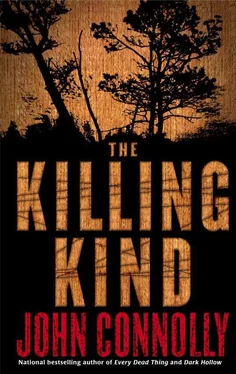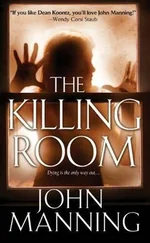“He'll kill me if I tell you,” says Bargus.
“I will kill you if you don't.”
Then Lester Bargus says his last words, and they reveal a prescience that I didn't think Lester would ever have. “You're going to kill me anyhow,” he says, and something in his voice tells the gunman that this is all he is ever going to get out of Lester.
“Yes,” says the gunman. “I am.”
The shots sound incredibly loud after the conversation that has just taken place, but also distorted and muted as the sound levels fail to cope with them. Lester Bargus jolts as the first bullet takes him in the chest, then keeps bucking and spasming as the rest of the shots tear into him, the static-ridden thunderclaps coming again and again until it seems that they will never end. There are ten shots, then there is a noise and a movement from the left of the picture as part of Jim Gould's body appears in the frame. Two more shots come and Gould falls across the counter as the gunman springs across it and darts into the rear of the store. By the time the ATF agents reach the scene, he is gone.
On the counter, now soaked with Lester Bargus's blood, the photograph remains. It is a picture of a group of demonstrators outside an abortion clinic in Minnesota. There are men and women holding placards, some obviously screaming their protests as police try to hold them back while others stand openmouthed in shock. To the right of the picture, the body of a man lies slumped against a wall as medics crowd around him. There is black blood on the pavement and on the wall behind him. At the fringe of the group another man has been caught in the act of walking away, his hands in the pockets of his overcoat, tiny hoods of skin shrouding his eyes as he looks back toward the dying man, his face inadvertently revealed to the camera. A red circle has been drawn around his head.
In the photograph, Mr. Pudd is smiling.
The man who killed Lester Bargus had flown into Logan Airport one day earlier and entered the country on a British passport, claiming to be a businessman interested in buying stuffed animals. The address he gave to immigration officials was later revealed to be the site of a recently demolished Chinese restaurant in Balham, south London.
The name on the passport was Clay Daemon.
He was the Golem.
THAT NIGHT, as the bodies of Lester Bargus and Jim Gould were taken to the morgue, I headed over to Chumley's on Bedford, the Village's best bar. Technically it was between Barrow and Grove, but even people who'd been going there for the best part of a decade still had trouble finding it on occasion. There was no name outside, just a light over the big door with the metal grate. Chumley's had started life as a speakeasy during Prohibition, and it had maintained its low profile for over seventy years. On weekends it tended to attract the kind of young bankers and dotcommunists who all wore blue shirts with their suits, on the grounds that nonconformists like them had to stick together, but during the week Chumley's was still recognizable as the bar that Salinger, Scott Fitzgerald, Eugene O'Neill, Orson Welles, and William Burroughs used to frequent as a change from the White Horse or Marie's Crisis.
The clouds hung low over the Village as I walked, and there was a terrible stillness in the air that seemed to communicate itself to the people on the streets. Laughs were subdued; couples bickered. The crowds emerging from the subway wore tense, fractious expressions, their shoes too tight, their shirts too thick. Everything felt damp to the touch, as if the city itself were slowly perspiring, expelling filth and waste through every crack in every sidewalk, every fissure in every wall. I looked to the sky and waited for the thunder, but none came.
Inside Chumley's, the Labradors lounged uneasily on the sawdust-strewn floor and people stood at the tiny bar or disappeared into the darkened alcoves at the far end of the room. I took a seat at one of the long benches by the door and ordered a hamburger and a Coke.
It seemed like a long time since I had been back in the Village, as if decades rather than months had passed from the day that I left my apartment to travel back to Maine. Old ghosts waited for me on these corners: the Traveling Man at the corner of St. Mark's in the East Village, the phone booth still marking the place where I had stood after he sent me my daughter's remains in a jar; the Corner Bistro, where Susan and I used to meet when we were dating; the Elephant amp; Castle, where we had brunch on Sundays in the early months of our relationship, heading uptown afterward to walk in Central Park or browse in the museums.
Even Chumley's was not immune, for were these not the same dogs that Susan used to stroke while she waited for her drink, the same dogs that Jennifer once held after her mother told her how beautiful they were and we took her to meet them as a treat? All of these places were potential bubbles of hurt waiting to be pricked, releasing the memories sealed within. I should have felt pain, I thought. I should have felt the old agony. But instead, I experienced only a strange, desperate gratitude for this place, for the two fat old dogs and for the unsullied memories with which they had left me.
For some things should never be allowed to fade away. It was both good and proper that they should be recalled, that a place should be found for them in the present and the future so that they became a precious part of oneself, something to be treasured instead of something to be feared. To remember Susan and Jennifer as they once were, and to love them for it, was no betrayal of Rachel and of what she meant to me. If that was true, then to find a way to live a life in which lost loves and new beginnings could coexist was not to besmirch the memory of my wife and child. And in the quiet of that place I lost myself for a time, until one of the Labradors waddled sleepily over and nosed at my hand for attention, his dog jowls shedding warm spit on my pants and his soft eyes closing happily beneath the weight of my hand.
I had found a copy of the Portland Press Herald in Barnes amp; Noble at Union Square, and while I ate, I scanned the pages for reports on Eagle Lake. There were two: one was a description of the ongoing difficulties in uncovering the remains, but the main piece announced the suspected identities of two of the dead. They were Billy Perrson and Vyrna Kellog, and they were both homicide victims. Billy Perrson had died from a gunshot wound to the back of the head. Vyrna Kellog's skull had been crushed, apparently with a rock.
Slowly, the truth about the fate of the Aroostook Baptists was being revealed. They had not dispersed, scattering themselves to the four winds and taking with them the seeds of new communities. Instead they had been murdered and consigned to a mass grave on a patch of undeveloped land; and there they had remained, trapped in a forgotten cavity of the honeycomb world, until spring daylight had found them.
Was that why Grace had died-because in breaking through the dead layers obscuring the past, she had found out something about the Aroostook Baptists that nobody was ever supposed to discover? More and more I wanted to return to Maine, to confront Jack Mercier and Carter Paragon. I felt that my pursuit of Mr. Pudd was drawing me away from the investigation into Grace's death, yet somehow Pudd and the Fellowship had a part to play in all that had occurred. He was linked to her passing in some way, of that I was certain, but he wasn't the weak link. Paragon was, and he would have to be confronted if I was to understand what had driven someone to end Grace's life.
But first, there was Mickey Shine. I had checked the Village Voice and found the exhibition listings. The Cloisters, which housed the Metropolitan Museum's medieval collection, was hosting a visiting exhibition on artistic responses to the Apocalypse of St. John. An image of Jack Mercier's bookshelf flashed before my eyes. It seemed that the Met and Mercier currently shared an interest in books and paintings about the end of the world.
Читать дальше












